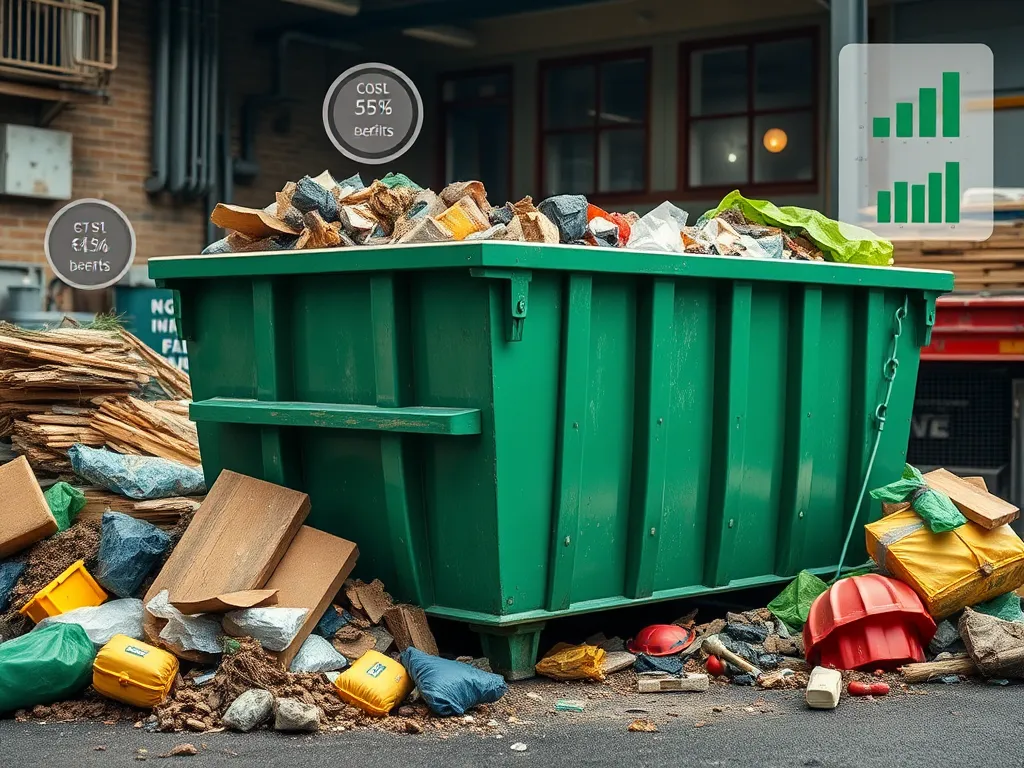Ultimate Guide to Front-Load Dumpsters: Cost and Benefits

Understanding Front-Load Dumpsters: A Comprehensive Guide
Front-load dumpsters are a practical solution for waste management, designed primarily for commercial and industrial applications. These dumpsters are distinct because they have a front-loading mechanism, which allows for easy access from the front. This makes them ideal for businesses that generate a significant amount of waste or have space constraints, as they can be placed in tighter areas compared to traditional dumpsters.
These dumpsters come in various sizes to cater to different business needs, typically ranging from 2 to 8 cubic yards. The versatility of front-load dumpsters makes them suitable for various industries, including restaurants, retail, and manufacturing. They can handle a wide array of waste types, from general refuse to recycling materials, making them a flexible choice for many operations.
When it comes to front-load dumpsters, businesses can choose from standard sizes or specialized options. The standard sizes cater to most commercial waste needs, while specialized options might include features like locking lids for security, built-in chutes for easier waste disposal, or additional compartments for recycling.
In comparing front-load dumpsters to other types, such as roll-off dumpsters, the significant difference lies in their loading method and functionality. Front-load dumpsters are designed for frequent pickups and are used in scenarios where businesses need regular waste removal. This makes them more suitable for situations with limited space where open-top roll-off dumpsters might not fit.
Understanding the nuances of front-load dumpsters allows businesses to make informed decisions about their waste management processes, ensuring efficiency and compliance with local regulations while minimizing costs.
Types of Front-Load Dumpsters
Front-load dumpsters are available in standard sizes suited for commercial use, typically ranging from 2 to 8 cubic yards. The 2-yard dumpster is ideal for small businesses, while larger establishments may require 4-yard or 8-yard dumpsters to accommodate higher volumes of waste. This variety allows businesses to choose a size that best meets their waste generation needs, ensuring they only pay for the space they need.
In addition to standard sizes, specialized front-load dumpster options are available. These may include weatherproof models for outdoor use, sealed units to deter pests, or dumpsters designed specifically for recycling to help businesses meet sustainability goals. Such options provide additional functionality based on the unique needs of different industries.
When comparing different styles of front-load dumpsters, businesses should consider factors such as accessibility, frequency of use, and the types of waste generated. Each style has its own benefits, and businesses should evaluate which style aligns best with their operational requirements.
For those seeking community resources, the guidelines for waste management in Prosper TX provide essential information.
Cost of Front-Load Dumpsters
The cost of renting front-load dumpsters can vary widely based on several factors. These include the size of the dumpster, the frequency of pickups, and the type of waste being disposed of. For instance, specialized dumpsters may incur higher rental costs due to additional features or enhanced capabilities.
On average, rental costs for front-load dumpsters can range from $200 to $600 per month, depending on the size and service contract. Smaller dumpsters may be on the lower end of the spectrum, while larger ones or those requiring more frequent pickups tend to cost more.
Businesses looking at long-term vs. short-term renting strategies need to consider their waste generation patterns. Long-term contracts often come with discounted rates, which can be beneficial for steady waste producers, while short-term rentals may suit businesses with fluctuating waste needs better.
Benefits of Using Front-Load Dumpsters
Front-load dumpsters offer numerous advantages for businesses and industries. They facilitate regular waste removal without taking up significant space, and their durable construction allows them to handle various types of waste efficiently, reducing overflow and improving cleanliness.
From an efficiency standpoint, front-load dumpsters streamline the waste management process. Their design allows for quicker pickup times, which can lead to lower operational costs for businesses that rely on regular waste disposal services.
Moreover, using front-load dumpsters can have positive environmental impacts. By encouraging proper waste separation and disposal practices, these dumpsters help minimize landfill waste and promote recycling efforts, contributing to a more sustainable business model.
Choosing the Right Front-Load Dumpster
When selecting a front-load dumpster, businesses should begin by assessing their waste needs. Evaluating the type and volume of waste generated will help determine the appropriate size and style of dumpster required for efficient disposal.
Size recommendations can vary based on the type of business. For example, restaurants may benefit from 4 to 6-yard dumpsters due to higher food waste volumes, while small retail shops might find 2-yard dumpsters sufficient for their needs.
First-time renters should focus on understanding their waste disposal patterns and service provider offerings. It's also crucial to inquire about service frequency, contract terms, and additional fees to avoid surprises later on.
Front-Load Dumpster Maintenance
Regular maintenance of front-load dumpsters is essential to prolong their lifespan and maintain hygiene. This includes routine cleaning to prevent odors and pests, as well as checking for any damages that could impact their functionality.
Common issues with front-load dumpsters can include malfunctioning lids or doors, which can compromise waste security and hygiene. Addressing these issues promptly with a waste management service can help avoid more significant problems down the line.
Implementing best practices for maximizing the lifespan of front-load dumpsters includes ensuring they are not overloaded and keeping them in accessible locations for easy collection access. Regular assessments can also help maintain their condition and efficiency for years to come.
